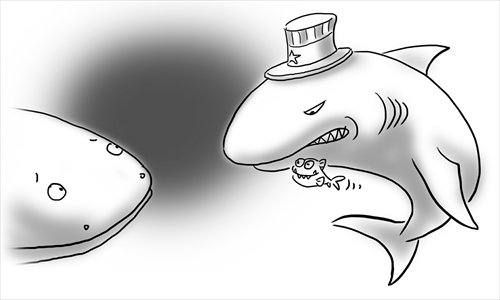HOME >> OP-ED
Japan’s deep unease skews views on China
By Ding Gang Source:Global Times Published: 2016-4-13 22:13:01

Illustration: Liu Rui/GT
We interviewed Yukio Hatoyama, former Japanese prime minister, on the afternoon of the very day that we arrived in Japan.Hatoyama is known as a "pro-China" politician. In 2009 after he was elected as prime minister, he pledged not to visit the Yasukuni Shrine, which enshrines Japanese war criminals responsible for atrocities during WWII. In 2013, he said the Japanese government should admit that there is a substantial territorial dispute with China over the Senkaku Islands, known as Diaoyu Islands in China.
I asked Hatoyama two questions: Why can't his point of view about Japan's aggressive history be more widely accepted in Japan? And how to deliver an accurate view of history to the Japanese?
Hatoyama said historical events such as the Diaoyu Islands problem and the Nanjing Massacre haven't been fully and accurately elaborated on in Japanese textbooks. He added that the deficiency of education in postwar Japan over the past several decades has led to erroneous views of history held by one generation or two.
Hatoyama visited the memorial hall of the victims in Nanjing massacre by Japanese invaders in the eastern Chinese city of Nanjing in 2013. He told me the purpose of his visit was to apologize for Japan's wartime crimes. He said it's not important whether the number of the victims totals 300,000 as China says, as even killing one person is a crime. He will keep apologizing until the Chinese say "it's enough."
Hatoyama added that no matter how much pressure he gets from the Japanese media and government, he will be persistent in telling the truth to the Japanese public, since only facing up to history correctly can lead to a rapprochement among China, Japan and South Korea.
Nonetheless, although he once took the helm of the country, Hatoyama is in the minority in Japan. He is even often verbally abused by extreme nationalists online. At one reception, some Japanese attendants purposely turned their heads away from Hatoyama when he arrived.
It reminds me of the exclusiveness in Japanese culture. Japan is a collectivist society. People who do not act the same with others will be isolated.
Like in a village, everyone must stick together with each other. If one person breaks the rule, he or she will be banished from the community. This is the most severe punishment. Nowadays, the nation is suffering from high student suicide rates, because teenagers cannot stand isolation from others.
Hatoyama sticking to his guns despite his isolation is admirable. But his islation reflects the severity of Japan's swing to the right.
Hatoyama also mentioned another reason. Given the fact that China's GDP has outrun Japan, while the Japanese economy remains sluggish, some people's attitude toward China has turned from admiration to jealousy and then anxiety. This has caused the right-wing shift in the country.
Chinese Ambassador to Japan Cheng Yonghua likes describing Japanese people's changing attitudes toward China with a metaphor. He said that the Japanese used to consider China as a tiny little hill in their backyard, yet the hill has somehow turned into a huge mountain overnight. It made it hard for Japanese to adapt to the new situation.
The change of the Abe administration's China policy mirrored the change in Japan's public discourse. In 2006, Abe announced he would visit China as soon as he assumed the office. But, when he won the re-election to a second term as prime minister in 2012, he changed his attitude toward Beijing immediately, and for that, the change in public opinion is a crucial reason.
Most Japanese journalists we talked to support Abe. They believe that the public agree with Abe's China policy, because people believe that only siding with the US to contain China can they feel secure, and ensure that the current order in Asia won't be upset by the rise of China.
The constant change of public opinion in Japan is not the only case around Asia. It is happening in other countries as Washington is rebalancing to the Asia-Pacific under the banner of human rights, democracy, and international law. This new dynamic warrants particular attention.
The author is a senior editor with People's Daily, and currently a senior fellow with the Chongyang Institute for Financial Studies at Renmin University of China.dinggang@globaltimes.com.cn Follow him on Twitter at @dinggangchina
Posted in: Columnists, Viewpoint